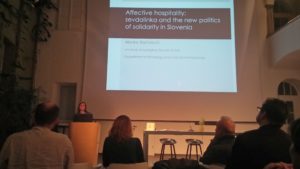BASE delovna skupina SIEF (International Society for Ethnology and Folklore): Telesa, afekti, čuti in čustva
3. delavnica v Ljubljani, bo 4. in 5. junija 2020
Kraj: Znanstvenoraziskovalni center Slovenske akademije znanosti in umetnosti
Tretja BASE delavnica želi predstaviti raziskave, ki jih opravljajo članice in člani delovne skupine in drugi raziskovalke_ci, katerih raziskave so osredotočene na telo, afekte, čute in čustva.
K sodelovanju vabimo 20-minutne predstavitve znanstvenic_kov iz polja umetnosti, humanističnih in drugih ved, ki se osredotočajo na telesa, afekte, čustva, čute iz različnih vidikov (iz diahrone in sinhrone perspektive, itd.). Posebej pozdravljamo predstavitve, ki se osredotočajo na »kolektivna postajanja” – afektivno politiko v času svetovnih uporov.
Predloge z največ 300 besedami, ki jih spremlja življenjepis z največ 100 besedami, pričakujemo do ponedeljka, 3. februarja 2020 na e-pošto: ahofman@zrc-sazu.si in na basewg@siefhome.org.
Organizator_ke delavnice v Ljubljani :
Dr. Ana Hofman, dr. Martin Pogačar, Teja Komel Klepec (Inštitut za kulturne in spominske študije ZRC SAZU)


